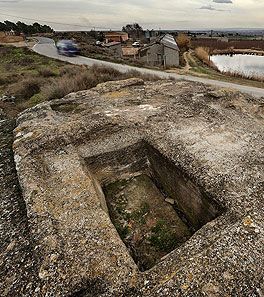The context
Current landscapes are the result of centuries of history. The survival of traces of the past in the land helps to define the character and identity of a given landscape. These testimonies are basic components for thinking about the future of these landscapes.
Historic landscape characterisation
Historic landscape characterisation studies aim to reconstruct the historic landscape from ancient times and show how the changes produced throughout the centuries are still present in the current landscape. Historic characterisation studies seek to better understand the past while also serving as a useful tool for spatial managers and planners, as well as a powerful instrument for awareness and education in the landscape and in history.
Historic landscape characterisation studies have a great tradition in England and in the rest of Great Britain, and the methodology used successfully in these countries has also been applied recently in some Mediterranean areas. Since 2000, these studies have been adapted and linked to the principles of the European Landscape Convention.
Main European references
The origins of this kind of study are found in England, specifically in the Cornwall peninsula in 1994. The government programme that develops these kinds of studies is Historic Landscape Characterisation (HLC), promoted by the agency English Heritage. This programme provides for the creation of maps that reflect the historic landscape characteristics of a place, identify the gaps and shortcomings in the historical and archaeological research done previously, enable the participation of the people living in the area and provide information to the bodies responsible for spatial management and planning. A very high percentage of English districts already have their own HLCs, created in agreement with some similar basic criteria.
Recently, work has also begun in England on Historic Seascape Characterisation (HSC), which strives, using maps, to understand the cultural processes that have allowed the current landscape of the coasts and marine areas to take shape.
In Scotland the historic landscape characterisation project is called the Historic Landuse Assessment o (HLA). This is a project promoted jointly by Historic Scotland and the Royal Commission on the Ancient and Historical Monuments of Scotland (RCAHMS). In the Scottish case, the HLA project is based on maps about the historic origin of different land use according to the period, the forms and their functions. At present, more than 65% of the country has been mapped.
In 1998, people started to prepare historic landscape studies in Wales on fifty-eight areas established in the Register of Landscapes of Historic Interest in Wales, sponsored by Cadw and by the Countryside Countryside Council for Wales. Cadw also promotes historic urban landscape studies.
HLC (Historic Landscape Characterisation), based on English methodology, has recently been applied in some districts in Ireland: Offaly, Westmeath, Laois, Limerick, Roscommon, Louth, Kerry and Fingal, promoted by the Irish Heritage Council.
For several years now in the Netherlands, the Ministry of Culture has been developing Landscape Biography programmes, which provide an integrated view of the evolution of the cultural landscapes of the Netherlands, both from its natural and human dynamics, as well as very useful information for spatial planners and managers at all levels, from state to local.
Newcastle University and the University of Edinburgh have applied the Historic Landscape Characterisation (HLC) methodology in an attempt to interpret how and when different landscapes were created in two areas located on the island of Naxos, in Greece, and in the vicinity of Silivri, in Thrace (west of Istanbul), Turkey.

Some groups that study the land in Catalonia from a historical perspective include:
- Centre d´Estudis Jordi Nadal d'Història Econòmica
- Centre de Recerca d'Història Rural (Institut de Recerca Històrica)
- Grup d'Estudis del Paisatge Històric (Departament d'Història de la Universitat de Lleida)
- Grup de Recerca d'Arqueologia, Història Antiga i Prehistòria (Institut de Recerca Històrica)
- Grup de Recerca en Àrees de muntanya i paisatge (GRAMP)
- Institut Català d'Arqueologia Clàssica